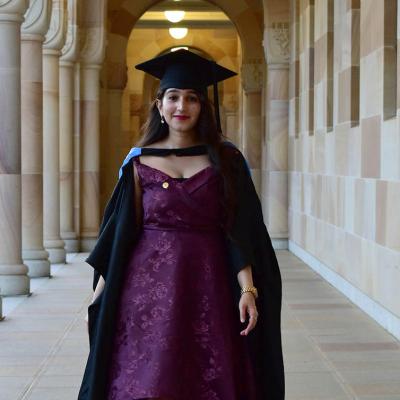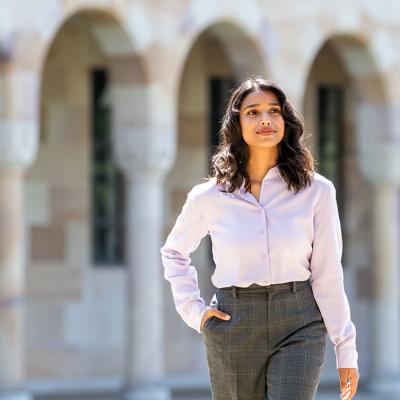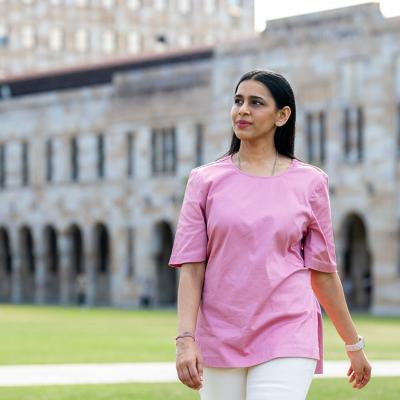Considering starting a postgraduate degree with a focus on mental health and counselling?
Whether you’re looking to expand your current skillset or jump into a new profession, studying mental health and counselling as a postgrad can help you achieve your goals.
We’ve talked to a UQ current student and alum to shed some light on this study area and help you discover the valuable skills you’ll learn in counselling and mental health courses at UQ.
Nisha Gupta is currently studying a Master of Counselling, and Shrika Charbhe is a graduate now working as an intake clinician at headspace.
Let’s delve into why they chose to study mental health and counselling, and what advice they have for others considering doing the same.
What inspired you to undertake counselling and mental health studies at a postgraduate level?
Nisha: As an undergraduate student, I engaged in various research projects, internships and volunteer work to gain practical experience and a deeper understanding of mental health and counselling. These experiences exposed me to the challenges individuals face in accessing quality mental health care, especially within marginalised communities.
It was during this period that I realised the need for counsellors who could provide culturally competent and inclusive support to diverse populations. This realisation, coupled with my undergraduate experiences and a strong desire to bridge the mental health gap, led me to the decision to pursue a postgraduate degree in counselling.
Shrika: I have always been intrigued by the human mind and its capabilities. I am a keen observer of people and like to know and understand their perspective on matters. Young people, in particular, are a vulnerable population and are faced with many challenges in the current times. Equipping the youth with knowledge and skills that will serve them well into adulthood and through different circumstances in life is important to me.
“Supporting young people’s growth and seeing them thrive brings me immense satisfaction and joy.”
Which counselling and mental health courses in your degree do you feel have helped you the most?
Nisha: The course Relationship Counselling taught by Professor Michael Ellwood provided me with a comprehensive understanding of the dynamics within various relationships, be it couples or other interpersonal connections. Through practical exercises and case studies, I developed effective communication strategies, conflict resolution techniques, and the ability to facilitate meaningful conversations between couples in distress. This course also emphasised the importance of cultural sensitivity in addressing diverse relationship issues, which has been invaluable in learning how to work with clients from different backgrounds.
“During my postgraduate journey in counselling, each course has contributed to my knowledge, skills and professional ethics, making me a more competent and compassionate counsellor.”
Shrika: There are some courses and assignments that were very interesting and helped me grow the most as a counsellor:
- The basic and advanced skills courses helped me practise and hone my counselling skills through constructive feedback from staff and peers.
- The portfolio assignment from the ethics course was crucial in helping me reflect on my journey as a counsellor and mapping my future pathway.
- The child and youth counselling and public health psychology courses required us to develop therapeutic resources and this piqued my interest in the area of resource development.
Overall, all the courses implored me to think deeply, analyse critically, and apply myself inventively.
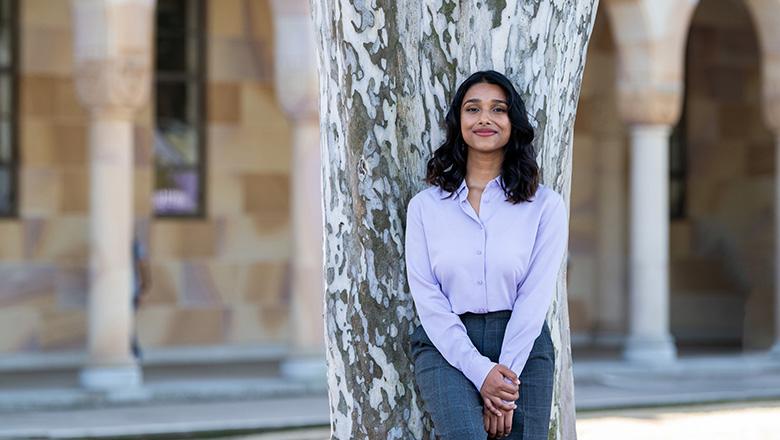
Nisha looked out for her own mental wellbeing by practising self-care and seeking support during her studies.
What has been your favourite course while studying counselling?
Nisha: My favourite course was Interpersonal Skills in Counselling. The course was highly focused on the practical aspects of counselling. It provided hands-on training in developing and honing essential interpersonal skills that are crucial for effective counselling, such as active listening, empathy, rapport-building, paraphrasing, and summarising.
The course was designed to be interactive and experiential. Instead of solely relying on lectures and theory, it emphasised experiential exercises, role plays, and real-life counselling scenarios. This interactive approach made the learning process engaging and dynamic. It also provided a safe and supportive environment to practise and refine these skills under the guidance of experienced instructors.
What did you learn during your mental health and counselling placements?
Nisha: My placement at headspace (a youth mental health organisation) bridged the gap between theory and practice and reinforced the concepts I had learned during my postgraduate program. The mentorship I received was invaluable as it provided guidance, feedback, and support in navigating complex cases and ethical dilemmas.
Self-reflection was encouraged as an essential aspect of professional growth during my placement. I regularly engaged in self-assessment, seeking to improve my counselling skills and enhance my self-awareness as a counsellor. I gained confidence in my abilities and developed a deeper sense of professional identity.
Placement also provided opportunities to network with fellow professionals, counsellors, and psychologists in the field.
“These connections continue to be valuable in my career, offering support and collaboration opportunities.”
Shrika: Placement was an excellent opportunity to apply myself in a practical setting and learn from counsellors and other clinicians. I received supervision and additional training from my placement that enhanced my academic experience and clinical skills. I believe this exposure was significant to mapping my career path after graduation and gaining employment in the field.
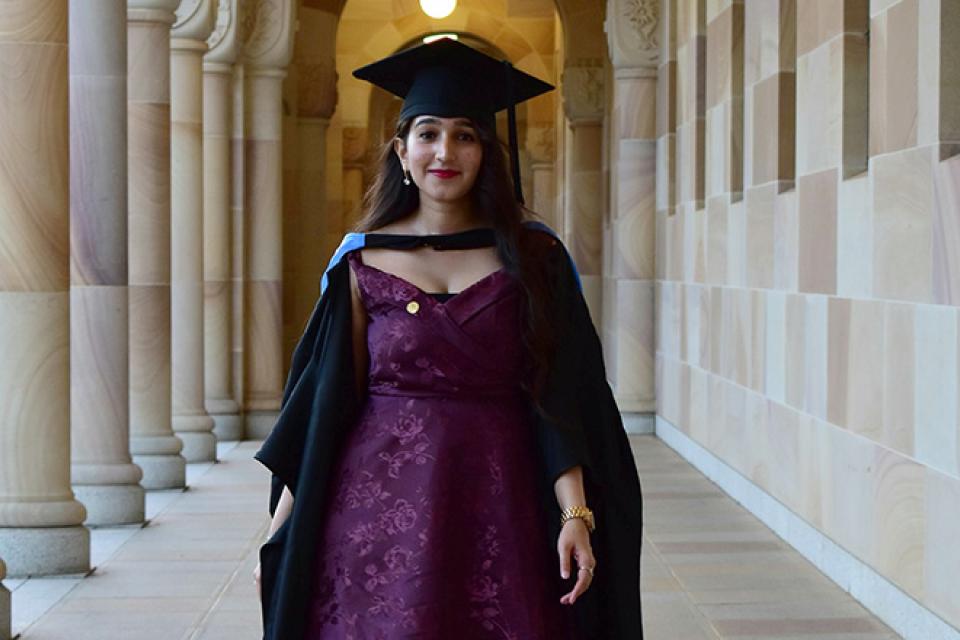
Shrika loves helping young people develop skills and techniques that assist them in reducing stressors while building on their strengths.
What does a day in the life of a counselling postgrad student look like?
Nisha: My average day was a blend of academic coursework, practical training, and self-directed study.
I typically started the day with morning lectures. Afterward, I would often have group discussions or case study analysis hangout sessions with classmates, which provided an opportunity for collaborative learning and peer support.
In the afternoons, I would sometimes have practical sessions or workshops where we practised counselling techniques and role-played different client scenarios under the guidance of experienced faculty members.
Evenings were usually dedicated to personal study and assignments. I would review course materials, conduct research for papers, and prepare for upcoming assessments. This self-directed study allowed me to delve deeper into specific topics of interest and consolidate my learning.
Apart from the academic aspects, I spent time in self-care practices, including cooking, taking care of the house and spending time with friends.
How has studying counselling at UQ helped you to achieve your career goals and find success in your field?
Shrika: It has helped me develop a strong foundational portfolio that is valued by employers within the profession and has prepared me for an array of potential career opportunities within counselling, not just in Australia, but the world over. This is why I recommend the program and university to all the future students who reach out to me for advice regarding postgraduate studies in counselling.
Why did you choose to study mental health and counselling at UQ?
Nisha: I chose UQ for my postgraduate degree because of its strong academic reputation, comprehensive counselling program that prioritises clinical training, practical exposure, and extensive coursework with a diverse curriculum, exceptional faculty, and commitment to multicultural competence. It aligns perfectly with my career goals and offers a diverse and enriching educational experience.
Is UQ the best place to study counselling, mental health and social work?
If you want to study social work, counselling or mental health courses and programs at university, UQ offers graduates a competitive edge. We’re ranked:
- #2 in Australia and #28 in the world for psychology, according to Times Higher Education World University Rankings 2025
- #3 in Australia and #34 in the world for psychology, according to QS World University Rankings by Subject 2025
- #4 in Australia for psychology, according to Shanghai Ranking 2025 Global Ranking of Academic Subjects.
How can you study counselling and mental health at UQ?
Whether you’re looking for a shorter postgraduate study option like a Graduate Certificate in Mental Health or something a little more comprehensive like a master’s in social work, we’ve got you covered. At UQ, you can study mental health and counselling in the following programs:
- Master of Counselling
- Master of Social Work (Qualifying)
- Master of Mental Health
- Graduate Certificate in Mental Health.
Find out how to get postgrad ready in 12 months or discover what it’s like to study postgraduate programs in other fields of interest.


